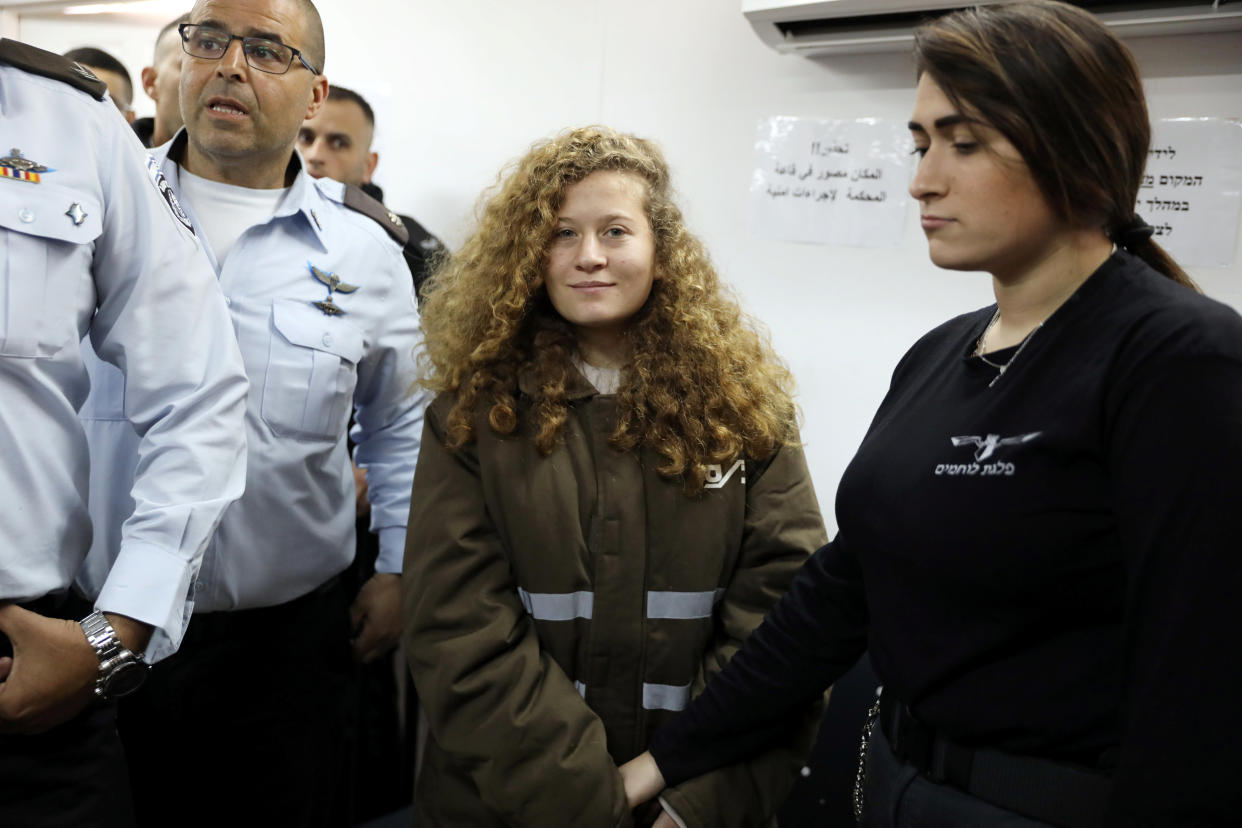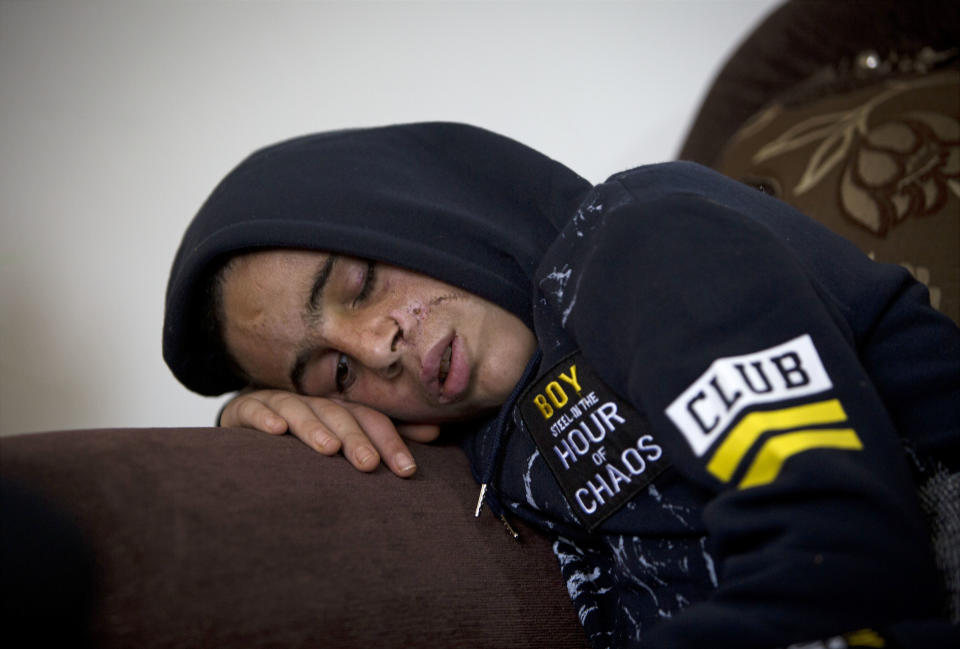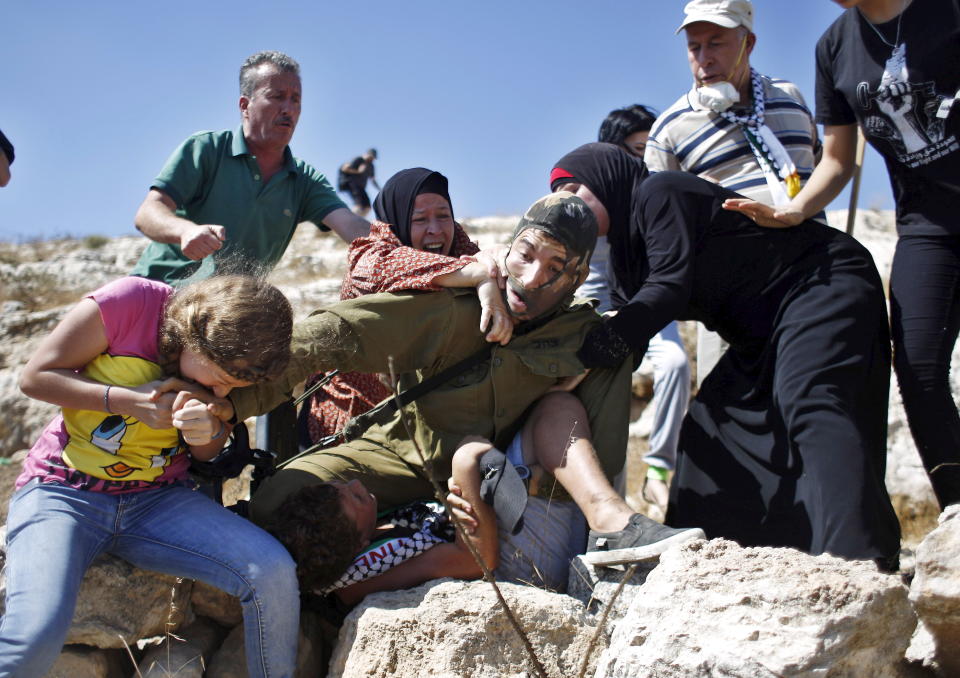In West Bank, teenager's arrest sheds light on two-tiered legal system

NABIH SALEH, West Bank — Bassem Tamimi’s voice sounded frail and exhausted when he answered the phone. He had been answering calls about his daughter’s arrest by Israeli Defense Forces for days, “They surrounded my home,” he told Yahoo News. “Between 3 and 4 a.m., they attacked the village.”
His daughter, Ahed Tamimi, 16, was arrested last month in a pre-dawn raid on the family’s home. The arrest followed another video, posted to Facebook, of Tamimi protesting the Israeli occupation by slapping an Israeli soldier outside her house in Nabih Saleh.
In the video she is seen approaching an Israeli soldier and urging him to leave their property. Her father said the soldiers had been patrolling outside the village and came to the family home. Nabih Saleh villagers frequently protest Israeli military trespassing on their property, as part of their general resistance to the Israeli occupation in the West Bank. Frustrated, Ahed slapped him.
According to the indictment, she told the soldier, “‘Leave, or I’ll punch you,’ or words to that effect,” suggesting they were unsure of the translation.
Nabih Saleh sits just over 40 miles north of Jerusalem in the occupied West Bank. Nearly 600 people live in the village and most of them belong to the Tamimi extended family. The village is known for actively protesting the occupation, including by throwing rocks at Israeli soldiers.
“The rocks are not violent,” Tamimi said, when she was first interviewed by Yahoo News two years ago, “because the soldiers have guns and bullets. The rocks are nothing.”
At the time, Tamimi also said she hoped to be come a lawyer one day and fight from inside a courtroom, but she also knew she could end up in court as prisoner. She explained, “If [the Israeli military] put me in jail, I don’t care. We’ll take it to the court. The occupation is continuous and they [continue] to kill Palestinians.”
She didn’t want to become a martyr, knowing it would be painful to her mother. She was a teenager who listened to pop music on her headphones and cared about her hair and makeup and hanging out with her friends. Now, two years later, her face and the slogan “Free Ahed” have become ubiquitous on social media channels dedicated to the Palestinian resistance.
Tamimi approached the soldiers within about an hour after another Israeli soldier shot her 15-year-old cousin with rubber bullets during a clash. Her father said she was upset by the incident.

Tamimi’s arrest was the latest source of friction over Israel’s decades-long military occupation of the West Bank. Protests in the occupied West Bank increased after President Trump declared Jerusalem the sovereign capital of Israel and announced that he would relocate the U.S. Embassy from Tel Aviv. Previous U.S. presidents have avoided moving the embassy or acknowledging Jerusalem as the capital, treating it as an issue to be negotiated between the Israelis and the Palestinians, both of whom have claims to the city.
A spokesman for Tamimi’s legal team, Jonathan Pollack, told Yahoo News, “The extraordinary thing here is her arrest was televised [by the Israeli authorities], indicating how much this is a media-driven case and not really a legal one.”
Pollack explained that no one in Israel really cared about the Tamimi family before; although they have been active in protesting the occupation, they were regarded as little more than a nuisance. But when the video of her slapping a soldier went viral, “right-wing Israelis turned it into a media circus,” he said, and made an issue of what they viewed as an insult to “our soldiers’ honor and pride.”
He added the military doesn’t normally broadcast the arrest of minors. Doing so in this case, he believes, “points to their intention and their motivation” of making an example of Tamimi.
Israeli military officials confirmed in an email statement to Yahoo News that “arrests are often carried out at night, due to operational reasons, and in an attempt to minimize the effect of such operations on the daily life in the area.”
But they did not respond to questions concerning their choice to televise Tamimi’s arrest, or acknowledged her status as a minor.

Tamimi’s case has become a rallying point among Palestinians. In 2015, Tamimi became famous on the internet when a photo surfaced of her screaming and biting an Israeli soldier who had her younger brother in a headlock.
Pollack explained that “Israel has two different systems of law in play at the same time: There are Israeli citizens, including citizens who illegally live in the West Bank; [they] are subject to the Israeli judiciary system,” which he said is “a lot more lenient.”
The settlements of Israeli citizens in the occupied West Bank are considered illegal under international law and until recently as “illegitimate” under U.S. policy. But that may be changing under the Trump administration, which has declared Jerusalem the Israeli capital and has suspended funding for Palestinian aid in an attempt to get Palestinians to participate in U.S.-led peace talks.
But the Palestinians, Pollack added, “are subjected to military law, which is not based on legislation but on the decrees issued by the military commanders. That didn’t even exist in apartheid South Africa. They had one legal system — it was discriminatory, it was bad, but it was a single system of law.”
The military’s media team did confirm Tamimi was arrested for assaulting an officer — and “for attacking security forces on five additional occasions, for throwing rocks during riots, and for threatening and inciting others to use violence.”
Her father, Bassem, who has been arrested nine times by Israeli forces on similar charges and served jail time, said, “They are isolating her, they want to make an example of her.”

The indictment itself details 12 specific offenses by Tamimi from the last two years, which is permitted under Israeli military law. Under Israeli civilian law, the prosecutors could only cite acts from the previous 12 months. Among other offenses, she is charged with inciting “stabbing attacks or suicide attacks” during a media interview.
But Pollack contradicted the Israeli prosecution, saying their Arabic “translation was inaccurate.” Tamimi is not calling for violent revolt at all, but rather she “refers to stabbing and suicide attacks as negative things that will happen as a result of Trump’s decision.”
Pollack also expressed concern over the conditions of Tamimi’s imprisonment at Hasharon Prison. “Prisoners are not supposed to be transported outside” the West Bank territories according to international law, he says. Procedures at the prison have made it hard to arrange visits by her lawyers.
Bassem has also not been able to visit his daughter. Israeli Defense Minister Avigdor Lieberman banned Bassem from traveling outside the occupied territories.
Bassem said, “I’m her father, I’m worried, I’m afraid.” He believes they are trying to break his daughter and he learned she had gone nearly “30 hours without sleeping” during the interrogation process.
Palestinians are often urged to sign confessions during interrogation. The confessions are written in Hebrew. Minors may incriminate themselves if they do not fully understand the charges against them.
Bassem said when Israeli forces came to their home in the middle of the night “they told me to bring the family to the sitting room and they took all of our electronic devices.” They handcuffed Ahed and took her away without telling the family where she was going.

The next morning, when Ahed’s mother, Nariman, went to the police station to look for her daughter, she too was detained and is also awaiting trial.
But Ahed Tamimi isn’t the only teenager from the family in Israeli custody. Nearly two weeks after her arrest, her cousin Mohammed was also detained — again, during a night raid.
His father, Bilal Tamimi, said soldiers came, also around 3 a.m., and angrily pounded on the door, “They told me they need his phone, [they said] ‘we should have his phone or we’ll have to punish everyone here.’
Mohammed volunteered to give them the phone. The soldiers questioned him alone in another room away from his family.
Bilal posted video on Facebook of his son hugging the family before going off with the soldiers and they avoided any violent altercation during the arrest. But he still does not have much information about his son’s condition or the charges against him.
Under Israeli military law, a minor has the right to have a parent or friendly adult present during interrogation, but in Ahed’s case Pollack said Israeli authorities claim “it would interfere with their investigation.” He said this was a “very unusual” step.
The Tamimi families are no strangers to arrest, imprisonment or clashes with Israeli forces. But they aren’t deterred. Bassem said when he followed Ahed out the door, he called out to her “Be strong!” He later wrote in an op-ed piece that “Ahed is a strong, fearless girl, and I am proud of my daughter’s steadfastness,” and that he believes in his family’s “right to continue our peaceful resistance against Israel’s brutal military rule.”
Nonprofit organizations like Amnesty International, Jewish Voice for Peace and B’Tselem have called for Ahed’s release and for changes to the two-tiered legal system in the Occupied Territories.
But for now, Tamimi remains in jail. The court ruled last week that she can be held until her case is decided. Tamimi is now isolated from her family, with no date set for her trial to officially begin — and no indication of when she might be freed. She remains the face of a deeply rooted conflict.

_____
Read more from Yahoo News:


